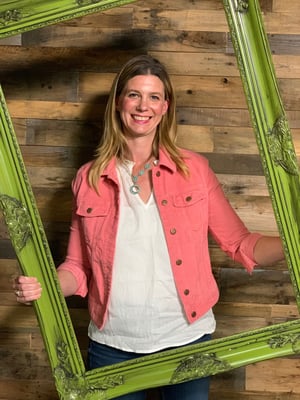
Our Guest:
Robyn Gobbel, LCSW, RPT-S has over 15 years of practice in family and play therapy experience, specializing in complex trauma, attachment, and adoption. Robyn is a therapist, trainer, and consultant who recently relocated to Grand Rapids, MI from Austin, TX. Robyn’s diverse clinical training includes EMDR (including EMDR adapted for children with attachment trauma), Somatic Experiencing, Theraplay, Trust Based Relational Intervention®, Circle of Security Parent Educator, The Alert Program® and Yogapeutics Aerial Yoga Level 1 Teacher Training. Robyn has integrated these training modalities with a foundation of attachment theory and the relational neurosciences to create an attachment-rich, sensory-sensitive, and relational neurosciences supported healing environment for children and families. Robyn consults, teaches, and trains extensively throughout the US, including as an instructor for the Foundations of Interpersonal Neurobiology Certificate Program at Portland Community College and with the Adoptive & Foster Family Therapy Post-Graduate Certificate Program offered by Portland State University and Oregon’s Department of Human Services.
Show Notes:
In this episode, we talked about:
- As parents, transitions are something that we don't want for our kids. We're moving a child from a place that might have not been very safe or stable and then going into a new home. In adoption, a loving and caring family is a beautiful thing; however, there is so much hard about it for the child.
- Having information on how to talk about grief and the transitions with your child gives you the building blocks needed to keep you from feeling verbally frozen.
- The thing to remember is that there is grief all around when we're talking about transitions and loss in adoption.
- One of the best things a parent can do is to just be aware of what the child needs.
- As the caregiver, when you are explaining why a transition is going on remember that you're not telling them something that they don't already know. Use age appropriate words and be as honest as possible. For example for a smaller child, "It wasn't safe and we're going to try to find people who will keep your tummy full, give you a clean bed to sleep in, etc."
- Professionals needs to make sure that the families are front-loaded with what to expect, how to respond, etc.
- As adoptees mature and age, there will be certain milestones that might trigger grief. There are many groups, books, and other resources that are now available that help the adoptee validate that they are not the only person who has felt this grief at this milestone which helps them know they are not alone.
- Grief never goes away but it gets stored in another part of the body and moves further away.
- Robyn's biggest tip is that we need to do our our work in grief and loss so that we're not afraid when our child expresses their own grief and loss. Adults need to learn to tolerate the grief.
Links and Resources Mentioned:
- GobbelCounseling.com (has additional trainings available for registration)
- Robyn's Blog
- Robyn's Facebook
- Robyn's Instagram
- Gladney Adoptive Parents can watch Robyn's two recorded trainings, Grief in Foster and Adopted Children (and Families) and Transitions: When Children Have to Move by logging into your MyGladney account, select trainings and then search by training name.
- Nurturing Adoptions, by Deborah Gray
Follow Us:
The reFRAMED podcast is created to educate, encourage, and inspire parents and professionals that have a love for children and want to meet their needs.
Where to subscribe: iTunes/Apple Podcast | Google Podcasts | Google Play | Stitcher | TuneIn | Spotify | RSS
Help Us Spread the Word! Please let your social media followers know about this podcast.
If you enjoyed this episode of the reFRAMED podcast, please head over to iTunes, leave a rating, write a review, and subscribe.
Now that you've heard our podcast, do you have further questions? Please email us at podcast@gladney.org and let us know.






